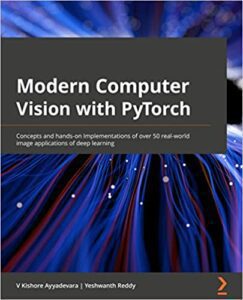V Kishore Ayyadevara is the author of Modern Computer Vision with PyTorch, Neural Networks with Keras Cookbook, Hands-On Machine Learning on Google Cloud Platform and SciPy Recipes. We got the chance to sit down with him and find out more about his experience of writing with Packt.
Q: How did you become an author for Packt? Tell us about your journey.
Kishore: I had a draft of content that I wanted to publish. I next reached out to one of the acquisition editors who suggested he is looking for authors for something else and that’s how my association with Packt and publishing in general, started. Since then, I have published 4 books and about to publish the 5th one.
Q: What was your motivation for writing this book?
Kishore: There is no single book where all the major works within Computer Vision domain are collated for a reader to learn – especially with the latest developments in this field. I wanted readers to have a faster learning curve in the field of computer vision than any other resource.
Q: How long did it take you to write the book?
Kishore: A little over a year.
Q: What kind of research did you do, and how long did you spend researching before beginning the book?
Kishore: Close to 6 months. The research was mostly around the organization of the book, the latest developments in the field that are to be included and the associated datasets.
Q: What’s your take on the technologies discussed in the book? Where do you see these technologies heading in the future?
Kishore: I see consolidation and best practices emerging in the field of Computer Vision for the known problems, discovery of new problems that can be solved, and emergence of new algorithms for the newer problems that can be solved.
There are frameworks that are being developed (like Detectron2 which we discussed in the book) for multiple known problems like object detection, segmentation. In future, I think there will be fewer lines of code that will be written to solve for such tasks – which a Data Scientist will be expected to be abreast of.
New problems like realistic face generation and fake detection or pose transfer is an active area of research. With the knowledge of various problems that can be solved using neural networks, the Data Scientist will be expected to come up with innovative ways of solving previously unsolved problems (like 3D object detection, environment understanding for a self-driving car, realistic face manipulation) and/or combine techniques in other domains like NLP/RL to solve a problem using a completely different approach.
Q: Did you face any challenges during the writing process? How did you overcome them?
Kishore: The primary challenge was in identifying the right dataset. The community is gracious to have open source datasets.
Q: How do you see these technologies benefiting society in the long run?
Kishore: The technologies that we learn in this book can be useful in multiple applications:
- Image classification: Identify the X-ray images that are suggestive of a disease.
- Object detection: Surveillance cameras that can help in detecting intruders/aid in road safety measures.
- Image segmentation: Intelligent photo editing.
- Image manipulation: Interact with historical personalities and/or preserve/re-create memories of loved ones.
- 3D object detection & RL: Multiple self-driving car applications.
Q: What advice would you give to readers learning tech? Do you have any top tips?
Kishore: Understand the working details and implement an algorithm from scratch. The more you fail in implementing certain algorithms and dig deep, the more you learn – so tweak the process in multiple ways and see the result.
Q. How do you keep up-to-date on your tech?
Kishore: Some prominent influencers on Twitter and LinkedIn are the primary source. Additionally, the problems solved at work are challenging and require considerable research on the latest in Data Science.
Q. Do you have a blog that readers can follow?
Kishore: No, I generally share updates over LinkedIn: https://www.linkedin.com/in/kishore-ayyadevara/
Q. How would you describe you author journey with Packt? Would you recommend Packt to aspiring authors?
Kishore: Definitely! I have seen Packt evolve over the last 3 years as a top notch publisher that is highly supportive of authors.
You can find Kishore’s books on Amazon by clicking on the cover image:












